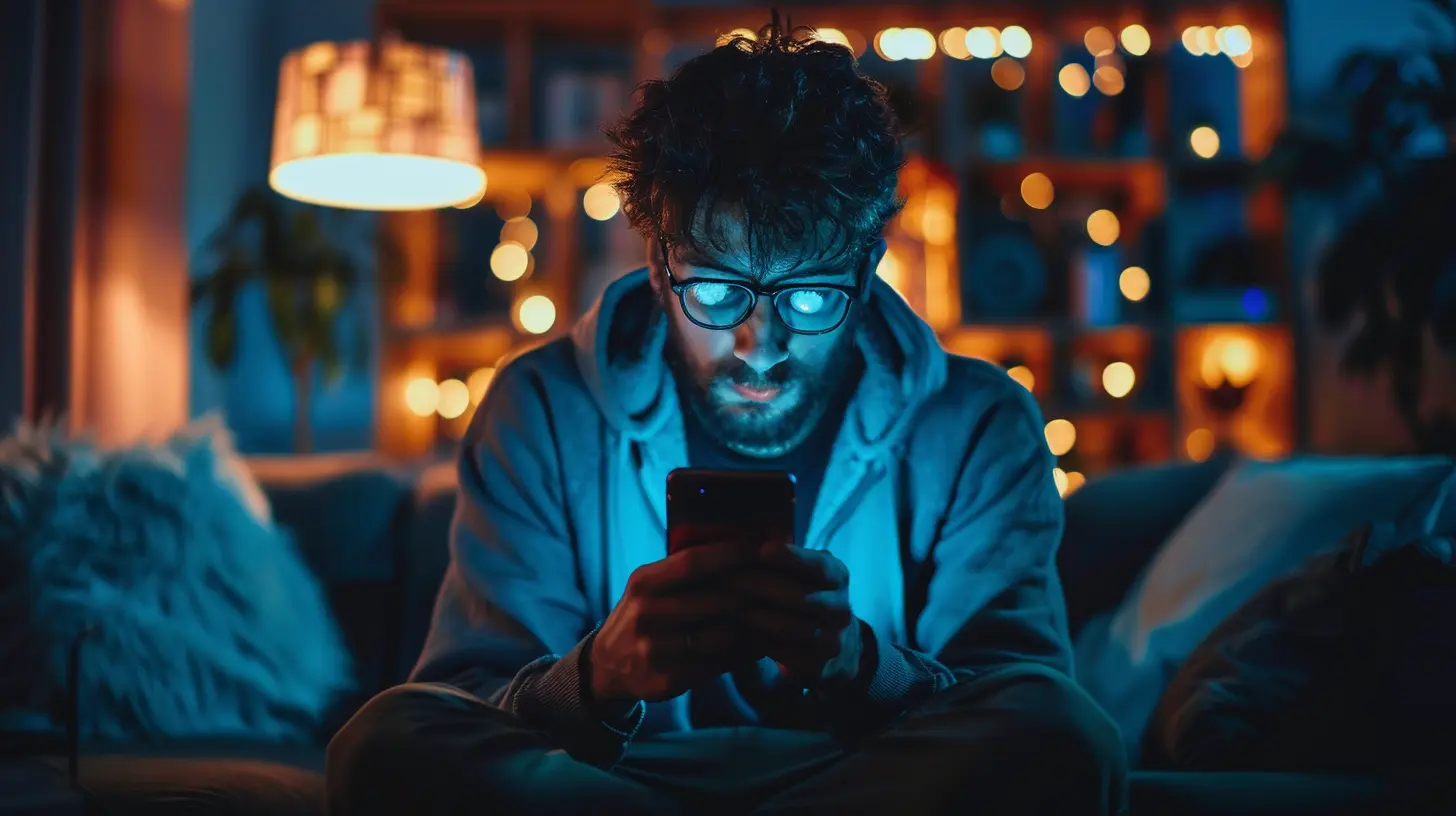The Mental Health Benefits of Disconnecting from Technology
12 November 2025
Ah, technology! The glorious double-edged sword that gives us cat videos and existential crises in equal measure. We live in a world where notifications ding like an orchestra of distractions, our attention spans rival that of a goldfish, and “doomscrolling” has somehow become a hobby. But guess what? Unplugging from technology—even just for a little while—can do wonders for your mental health.
Let’s dive into why taking a break from screens could be the best self-care move you didn’t know you needed.

The Digital Overload: Why We're All a Bit Frazzled
Ever feel like your brain is running on 27 tabs, and you have no idea where the music is coming from? That’s digital overload for you. With constant pings, emails, breaking news, and endless scrolling, our minds rarely get a moment of peace.Technology was supposed to make life easier, yet here we are—stressed, sleep-deprived, and somehow still feeling behind despite being connected 24/7.
So, what happens when we press the pause button on technology? Let’s break it down.

1. Better Sleep: Because Your Brain Deserves a Nap
If you’ve ever found yourself awake at 2 AM, staring at your phone like it's holding the meaning of life, you’re not alone. Blue light from screens messes with melatonin production, which basically means your brain gets tricked into thinking it’s high noon when it’s actually bedtime.By unplugging before bed, you give your brain the chance to do its job—preparing for restful, high-quality sleep. And trust me, nothing feels better than waking up actually refreshed instead of looking like a zombie straight out of The Walking Dead.
Tech Detox Tip:
Try ditching screens at least an hour before bedtime. Read a book, meditate, or do literally anything that doesn't involve staring into the void of social media.
2. Less Stress, More Sanity
Ever notice how scrolling through social media can turn a perfectly good mood into a spiral of anxiety? One minute you’re watching a cute dog video, the next you’re knee-deep in a thread about global catastrophes.Constant exposure to bad news, unrealistic comparisons, and endless digital noise cranks up cortisol levels (that’s the stress hormone, in case you skipped Biology 101). Disconnecting from technology helps bring those stress levels down, giving your nervous system a much-needed break.
Tech Detox Tip:
Turn off non-essential notifications. If it’s truly important, people will find a way to reach you.
3. Improved Focus: Say Goodbye to the Attention Span of a Goldfish
Ever try to read a book or work on a project, only to get distracted by a notification… which leads to checking social media… which somehow ends in you watching a 30-minute documentary on why ducks wag their tails?We’ve all been there.
Technology is fantastic, but it’s also a massive distraction machine. Each notification yanks our focus away, making it harder to concentrate. Taking time away from screens helps rebuild your ability to focus, making you more productive and present in the moment.
Tech Detox Tip:
Try the Pomodoro Technique—work for 25 minutes with your phone on airplane mode, then take a 5-minute break. Your brain will thank you.4. Stronger Relationships: Because Texting Isn’t the Same as Talking
Ever sat in a room where everyone’s on their phones, and the only sound is the occasional scroll-induced chuckle? Yeah, that’s modern socializing for you.Real relationships thrive on real conversations. When we put our phones down and give people our full attention, we build deeper connections. Plus, nothing beats an actual belly laugh with friends over some inside joke rather than just sending a “😂” in a group chat.
Tech Detox Tip:
Create phone-free zones at home—like during meals or family hangouts. Trust me, food even tastes better when you're fully present.
5. Boosted Creativity: Let Your Brain Wander for a Change
Remember being a kid and coming up with the wildest ideas just because your brain had time to be bored? Turns out, boredom is a breeding ground for creativity.Being constantly plugged in means our brains never get to roam freely. When we unplug, our minds have space to daydream, solve problems, and come up with brilliant ideas (or at least entertaining ones).
Tech Detox Tip:
Take a walk without your phone. Just let your mind wander and see where it takes you.6. A Break from the Comparison Game
Social media often feels like a highlight reel of everyone else's perfect lives—filtered vacations, gym selfies, gourmet meals that look suspiciously staged. Scrolling through all that can make you feel like your life is… well, kind of meh.But here’s the thing: It’s not real. Everyone’s got struggles, they just don’t post about them. Taking time away from social media helps you focus on your life instead of comparing it to whatever carefully curated version others are showcasing.
Tech Detox Tip:
Try a social media detox for a weekend and see how much lighter you feel. Spoiler alert: a lot.
7. Mindfulness: Enjoying Life in Real Time
Ever taken a photo of your food before even tasting it? You're not alone. But here’s a wild idea—what if we just enjoyed things instead of documenting them for the ‘Gram?Disconnecting from technology encourages mindfulness—fully experiencing the moment instead of filtering it through a screen. Whether it’s enjoying a sunset, eating your favorite meal, or having a hilarious conversation, being present makes everything richer.
Tech Detox Tip:
Next time something amazing happens, resist the urge to grab your phone. Just experience it. Crazy, right?How to Start Your Digital Detox Without Losing Your Mind
Now, I’m not saying you should move to a remote cabin and start communicating via carrier pigeon. But even small changes can make a big difference. Here are a few easy ways to disconnect:- Set Screen-Free Times – Mornings and before bed are great starting points.
- Use Technology Intentionally – Ask yourself, “Do I need to check my phone, or am I just bored?”
- Go for Walks Without Your Phone – Trust me, the world is still pretty interesting without a screen.
- Read a Physical Book – Yes, they still exist. And flipping pages feels oddly satisfying.
- Try a Social Media Break – A weekend away from the digital world can feel like a mental spa retreat.
Final Thoughts
Technology is awesome. It connects us, entertains us, and makes life incredibly convenient. But let’s be honest—sometimes it also makes us anxious, distracted, and straight-up exhausted.Taking regular breaks from screens isn’t about rejecting technology; it’s about using it in a way that serves you, rather than the other way around. So, go ahead—unplug, breathe, and give your mind the break it deserves.
Who knows? You might even remember what it feels like to be bored—and that’s not such a bad thing after all.
all images in this post were generated using AI tools
Category:
Mental HealthAuthor:

Paulina Sanders
Discussion
rate this article
1 comments
Ian McVaney
In our hyper-connected world, disconnecting from technology offers a vital reset for mental health. It fosters mindfulness, enhances real-life connections, and allows space for self-reflection, ultimately promoting emotional well-being and resilience.
November 26, 2025 at 3:44 PM

Paulina Sanders
Absolutely! Taking breaks from technology is essential for mental health, as it nurtures mindfulness, strengthens personal relationships, and encourages self-reflection, all contributing to greater emotional well-being.


